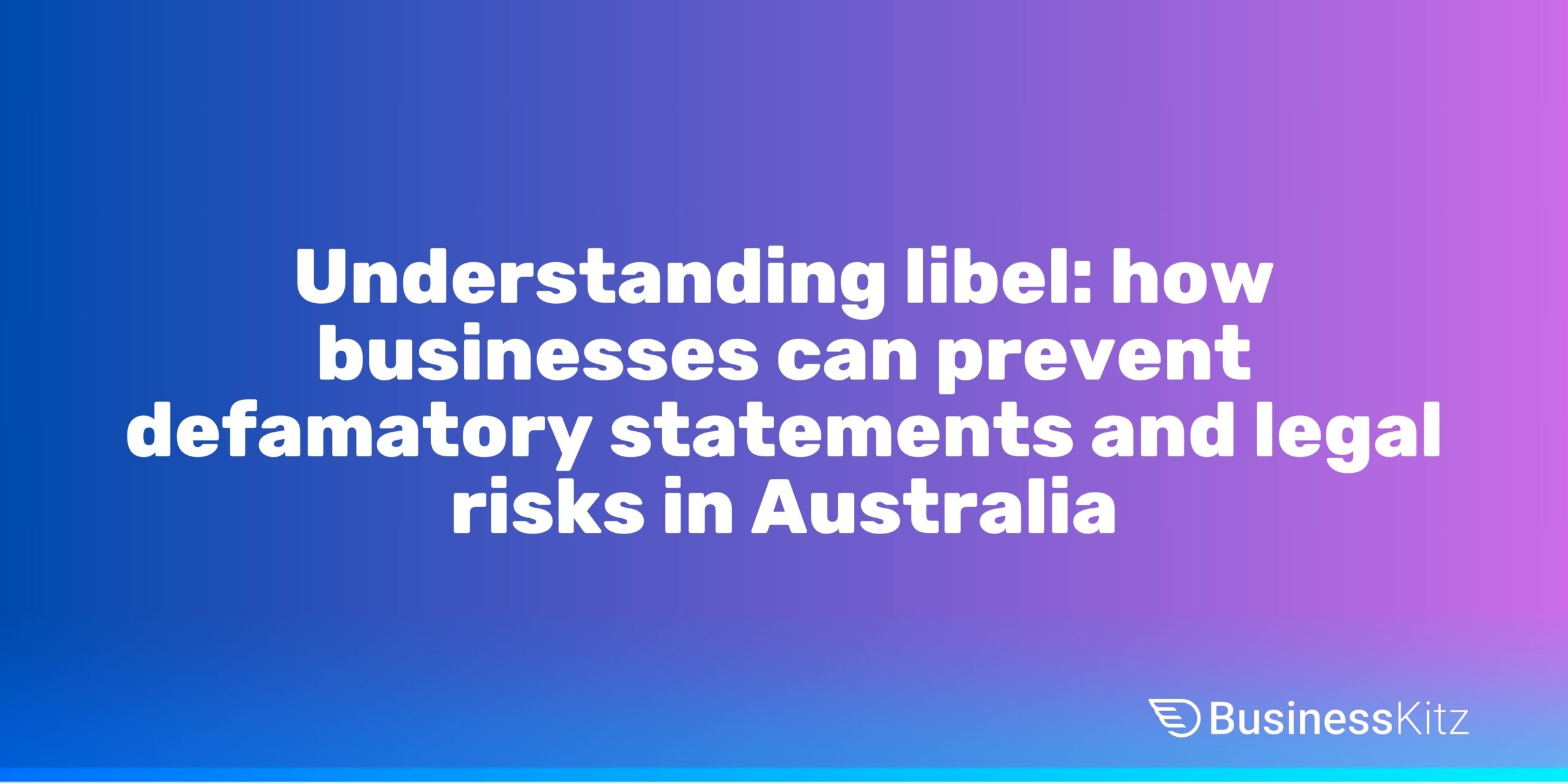
We've helped businesses save $55m with our all-in-one platform. Get instant access to this template and 115+ others, plus AI-powered document creation, starting completely free.
Protecting a business’s reputation is more important than ever. A single libel claim can lead to financial loss, legal action and damaged trust. With online reviews, social media and digital publications, false statements can spread fast. Businesses must understand defamation law and take steps to prevent legal risks.[ez-toc]
Libel is a false written or published statement that harms a person’s reputation. It can appear in news articles, social media posts, emails or websites. In Australia, libel and slander fall under defamation law, which protects individuals and businesses from defamatory statements. Companies must manage communications carefully to avoid legal action and financial loss.
Understanding the difference between libel and slander is key to knowing how defamation law works in Australia. Both involve making defamatory statements, but the way they are communicated changes how they are handled under the legal system.
Both forms fall under defamation law.
Australia abolished the distinction between libel and slander with the Defamation Act 2005 (Cth). Now, both are simply called defamation. This change means that whether a statement is written or spoken, the same legal rules apply.Before this change:
With modern defamation law, the focus is on whether a statement has caused harm rather than how it was delivered.
FactorLibel (written)Slander (spoken)MediumPublished in print or onlineSpoken in conversations, speeches, or broadcastsEvidence neededCan be shown in documents, emails, or postsMay require witness testimonyLasting impactPermanent record, easier to spreadTemporary unless recordedCourt approachNo need to prove actual damageUsed to require proof of financial harm before reforms
Businesses face serious risks from defamatory content, whether libel or slander.
Businesses must act quickly to address defamation issues. A review of communication policies, staff training and legal advice can help prevent costly disputes.

Australian defamation law protects people and businesses from defamatory statements. It balances freedom of speech with the right to protect reputation. The law applies to both libel and slander and covers statements made in publications, broadcasts or online.
The Defamation Act 2005 (Cth) created uniform defamation laws across all states and territories. It replaced common law rules and ensured that legal claims follow the same process in every state.Key features of the Defamation Act:
Businesses must be aware of these laws to effectively manage reputation risks and avoid legal action.
Some Australian states updated their defamation laws to stop trivial cases and protect public interest journalism. Key changes include:
These reforms help businesses understand their rights and responsibilities when handling defamation issues.
Several high-profile defamation cases have shaped Australian law:CaseDetailsOutcomeRebel Wilson v Bauer Media (2017)Wilson sued for defamatory articles in a news magazineWon $4.7 million, later reduced on appealGeoffrey Rush v Nationwide News (2019)Rush sued a newspaper for defamatory statementsWon $2.9 million, one of Australia's largest defamation payoutsGoogle v Defteros (2022)Google was sued for hosting defamatory content in search resultsThe High Court ruled in favour of GoogleThese cases show how defamation law impacts individuals, businesses and online platforms. Companies must monitor their communications and seek legal advice if facing a defamation claim.
Libel can have serious effects on businesses. A defamatory statement can lead to financial losses, legal action and long-term reputation damage. Companies must understand these risks and take steps to protect themselves.
Businesses can suffer significant financial losses due to libel. Even a single defamatory statement can lead to costly legal battles and a loss of customer trust.Key financial risks include:
These financial risks show why businesses must act fast to review and address libel claims.
A libel lawsuit can result in serious legal penalties. Businesses found guilty of libel may face:
Businesses should seek legal advice if they face a defamation claim.
Even if a business wins a libel lawsuit, the damage may already be done. A libel case can:
Protecting business reputation is key to long-term success. Companies must take steps to avoid libel disputes and respond quickly if defamation issues arise.

Businesses must take steps to prevent libel claims and manage defamation risks. A clear risk management strategy can help protect a company’s reputation and reduce legal exposure.
Businesses should create clear policies to prevent defamatory statements in both internal and external communications.Key steps include:
Preventing libel starts with clear policies and ongoing staff training.
Businesses must monitor their online presence and handle negative content quickly.Steps to manage online reputation:
Acting fast can limit damage and protect a business's reputation.
Keeping detailed records can help businesses prove the truth in case of a libel claim.How Business Kitz helps:
Proper documentation can help businesses defend themselves against libel claims and avoid costly court cases.
Businesses must manage legal risks to avoid libel claims and protect their reputation. Business Kitz offers tools and templates to help businesses stay compliant and handle communications responsibly.
Using legally compliant documents reduces the risk of defamatory statements. Business Kitz provides ready-to-use templates that help businesses stay within the law.Key benefits include:
Having proper legal documents helps protect businesses from lawsuits and promotes professional communication.
Having the right legal contracts and agreements in place can help protect businesses from defamation risks. Business Kitz offers customisable documents that safeguard sensitive information.Essential documents include:
Using these agreements helps businesses avoid disputes and better manage legal exposure.
Business Kitz simplifies compliance by streamlining document creation and storage.How it improves efficiency:
With Business Kitz, companies can manage legal risks, protect their reputation and minimise the risk of costly lawsuits.

Libel is a false written statement, while slander is a false spoken statement. Both fall under the tort of defamation and can cause injury to someone’s reputation. In Australia, the Defamation Act 2005 removed the legal divide between them, treating both under the same category of defamation.
A business should review its communications policies, employee training and service agreements. It should also ensure that all public statements are accurate and not defamatory. Businesses can use legal templates to minimise errors and protect privacy.
Australian defamation law is based on the tort of defamation. The Supreme Court handles serious cases. The law protects individuals and small businesses from defamatory statements. However, large companies usually cannot file defamation claims. The law also considers privacy rights, copyright concerns and public interest.
Yes, if a business publishes or promotes a false and harmful review, it may face legal action. A commission or regulatory body may also investigate the case. Businesses should monitor customer feedback and respond professionally to avoid legal trouble.
Australian defamation law follows traditional common law principles but has evolved to balance free speech and privacy. The law applies to modern digital platforms and services while still protecting against harmful falsehoods. It reflects a deep understanding of changing media culture.
Businesses can seek legal knowledge from qualified lawyers or legal services. They can also use contracts, confidentiality agreements and defamation disclaimers to reduce risks. Taking preventative legal steps can help businesses avoid costly lawsuits.
Understanding libel is key to protecting your business reputation. False statements can lead to financial losses, legal action and lasting damage. Businesses must take steps to prevent defamation claims and handle risks effectively.Proactive risk management and legal compliance help businesses avoid disputes. Clear communication policies, employee training and secure document storage reduce the chance of defamation issues. Strong legal agreements also protect sensitive information and set clear responsibilities.Business Kitz offers templates drafted by top-tier lawyers and document management solutions to keep businesses safe. With secure contracts, confidentiality clauses and efficient record-keeping, companies can reduce legal risks and focus on growth. Sign up for a free Business Kitz account!Disclaimer: This content is intended to be used for educational and informational purposes only. Business Kitz does not offer legal advice and cannot guarantee the accuracy, reliability, or suitability of its website content for a particular purpose. We encourage you to seek professional advice from a licensed professional and verify statements before relying on them. We are not responsible for any legal actions or decisions made based on the information provided on our website.Unless expressly stated otherwise, all content, materials, text, images, videos and other media on this website and its contents are the property of their respective copyright owners.
Copyright © 2025 Business Kitz 14312161